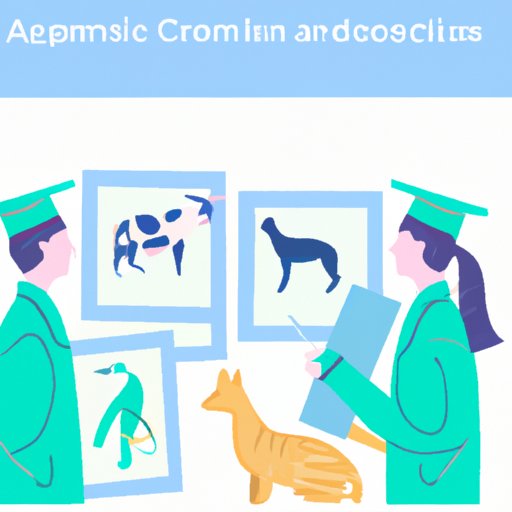Introduction
Animal science degree programs offer students the opportunity to gain knowledge and skills necessary for working with animals. These programs are designed to give students a well-rounded education that includes both theoretical and practical components. The purpose of this article is to explore the various paths of an animal science degree, the benefits of pursuing one, the types of careers available, and the coursework included.

Exploring Careers with an Animal Science Degree
Those who pursue an animal science degree have the option of entering a variety of career paths. According to the United States Department of Agriculture (USDA), some of the most popular jobs within the field include veterinarians, animal nutritionists, animal behaviorists, zoologists, and wildlife biologists. Those who work in these positions often work in research, conservation, or management of animals in zoos, aquaria, farms, laboratories, and other settings.
In order to pursue a career in animal science, individuals must possess certain skills. These include critical thinking, problem solving, good communication, and the ability to work with a wide range of animals. Additionally, those interested in animal science should have a strong understanding of biology, anatomy, and physiology.
Benefits of Pursuing an Animal Science Degree
There are many benefits to pursuing an animal science degree. One of the primary benefits is increased job opportunities. According to the Bureau of Labor Statistics (BLS), employment of veterinarians and veterinary technologists is projected to grow 19 percent from 2016 to 2026, much faster than the average for all occupations. Additionally, those with an animal science degree may find themselves with greater financial stability due to the higher salaries associated with such careers.
Pursuing an animal science degree can also lead to personal satisfaction. Working with animals can be incredibly rewarding, as those in the field have the opportunity to make a positive difference in the lives of animals and their owners.

The Different Paths of an Animal Science Degree
When it comes to an animal science degree, there are several options available. Individuals may choose to pursue a bachelor’s degree, master’s degree, or doctoral degree. A bachelor’s degree typically takes four years to complete and offers students the opportunity to gain a comprehensive understanding of animal science. Those who pursue a master’s degree typically spend two additional years studying and conducting research. Finally, those who pursue a doctoral degree will spend an additional three to five years studying and researching topics related to animal science.

Examining the Coursework of an Animal Science Degree Program
The coursework of an animal science degree program varies depending on the type of degree pursued. Generally speaking, all programs include core courses, specialized courses, and elective courses. Core courses typically include topics such as animal nutrition, reproduction, genetics, and physiology. Specialized courses focus on a specific area of animal science such as animal behavior or veterinary medicine. Elective courses allow students to customize their degree by exploring topics that interest them.
Research is also an important part of an animal science degree program. Students may participate in laboratory experiments and field studies, allowing them to gain hands-on experience with animals. Additionally, many programs require students to complete internships or practicums, which provide invaluable insight into the real-world application of animal science.
Conclusion
An animal science degree provides individuals with the opportunity to gain knowledge and skills necessary for working with animals. There are many benefits to pursuing an animal science degree, including increased job opportunities, financial stability, and personal satisfaction. Additionally, there are several paths to an animal science degree, including bachelor’s, master’s, and doctoral degrees. Finally, coursework in an animal science degree program typically includes core courses, specialized courses, and elective courses, as well as research and internship/practicum experiences.
Animal science degree programs offer a wealth of possibilities for those interested in working with animals. With the right education and skills, individuals can pursue a career path that provides both professional and personal fulfillment.
(Note: Is this article not meeting your expectations? Do you have knowledge or insights to share? Unlock new opportunities and expand your reach by joining our authors team. Click Registration to join us and share your expertise with our readers.)
